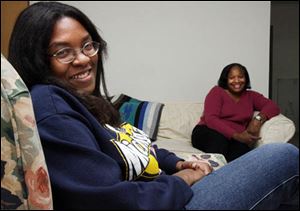
Refilling the empty nest
10/8/2006
Ryan Lewis is living with his parents in Monclova Township while working to establish himself at a commercial real estate firm.
The Blade/Dave Zapotosky
Buy This Image

Tamara Jones and her mother, Cynthia, say they enjoy living together but for now are sharing a car.
GAYLE EVERSOLE can still re-member how despondent she was when her only child left for college.
It took me a year to quit crying, said the mother of Ryan Lewis, now 23.
But gradually she and her husband, Gary, realized that having some space in their Monclova Township home wasn t all that bad.
It was kind of nice. So when he said he was moving back in, I said, wait a minute, Mrs. Eversole joked.After graduating in December from Baldwin Wallace College in suburban Cleveland, Ryan decided to move back home until he established himself at a commercial real estate ?rm that pays him straight commission and a stipend, which he must repay, of roughly $1,000 a month.

Ryan Lewis is living with his parents in Monclova Township while working to establish himself at a commercial real estate firm.
It s hard to pay the rent when you don t know how much money you ll have coming in, he said.
Although he doesn t pay rent at home, his monthly bills include $150 for health insurance, $50 for car insur-ance, $100 for gas, $100 for a cell phone, $40 for a gym membership, $120 to $150 on food, and $100 for a medical bill.
His student loans, roughly $10,000, are in deferment, which means he has been allowed to postpone paying them back for a set amount of time.
Ryan is one of the growing number of college graduates each year who move back with their parents. The boomer-ang effect is occurring because so many students have crushing debt from col-lege loans and credit cards, and the job market is less than robust.
The average outstanding balance was $29,000 for a student coming out college, according to a surveythis year by AllianceBernstein In-vestments. Three out of respon-dents said they found it dif? cult to pay off education-related debt.
Widespread trend
Another survey, by an entry-level-job Internet site called CollegeGrad.com, found two-thirds of students who gradu-ated this year moved back home because of a dif? cult job search, increased housing costs, and a high amount of debt.
The cost of living on your own hits home pretty immedi-ately, said Brian Krueger, presi-dent of CollegeGrad.com. With college loans to pay off and little or no money in the bank, it can be especially dif? cult to make ends meet.
The main difference from graduates of 25 to 50 years ago, said Mr. Krueger, is that lowercollege costs meant that grads were not coming out of school with extensive debt. Plus, grad-uates of yesteryear didn t have cell phones and probably didn t have multiple credit cards and other such expenses, he said.
The debt burden becomes heavier if you can t ?nd a full-time job in your ? eld, said Ta-mara Jones, 25.
A 2003 graduate of Kenyon College in central Ohio with a degree in international studies (with a focus on Japanese lan-guage and culture), Ms. Jones went further into debt to obtain a master of science in informa-tion degree from the University of Michigan.
Part-time job
That move was encouraged by her mother, Cynthia, herself a law ?rm librarian who hopes one day to ? nish her own bach-elor s degree and get a master s similar to the one held by her daughter.
I have really set myself back ?nancially to keep her in pri-vate schools throughout her education, including college, but I place a premium on edu-cation, said Cynthia Jones.
But with only a part-time job as an archivist at the University of Toledo paying approximately $10,000 a year, Ms. Jones lives in an Ottawa Hills apartment with her mother, taking her to and from work so she can have the one car they share.
She spends about $100 a month on insurance, plus co-pays for doctors visits and prescriptions, and occasion-ally pays the $62-a-month cable television bill.
Tamara and her mother both say they love living together, but the daughter said, I hope to have a full-time job relatively soon and then I ll pay off my debts. She estimated she owesclose to $90,000 in student loans, which she will have to start paying soon.
Paying off the college loans, she said, could mean paying $350 a month, probably for-ever.
I face a bit of a Catch 22. The jobs that I have the degree for, they want more experi-ence than I have, Ms. Jones explained. And for the jobs that I m perfectly capable to handle, they think I m overquali? ed because they saw my master s degree.
Search for work
Echoing her frustration is 21-year-old Kendra Draper, who graduated in August with a business degree from Bowling Green State University and has yet to ?nd a sales job.
I m doing a lot of interviews, but it s a hard, hard thing to do, said Ms. Draper, who lives with her family in Monclova Town-ship.
Most people want two or three years experience, but it s really hard to get that experi-ence if no one will let you start without any experience.
Ms. Draper went to school year-round to ?nish in three years, forgoing the traditional internships that many college students complete, because she has a 2-year-old daughter to support.
But even recent college grad-uates making money might not want to ? y the nest too quickly, said Jeff Savage, director of na-tional account sales for Sysco Specialty Meat Cos., headquar-tered in Northwood, and author of Millionaire by 40: 100 Secrets to Creating Wealth Not Taught in School.
Method of saving
One chapter is dedicated to encouraging graduates to stay at home for the ? rst couple of years, socking away the money they would pay on rent.
Saving $10,000 during that period could translate in to having $250,000 by the time the person reaches age 70, Mr. Sav-age said.
Of course it only works if you put the money in the bank, he added,
Living at home while looking for a job should be a tempo-rary solution, and graduates and parents should set limits on the arrangement, said CollegeGrad.com s Mr. Krueger.
My only recommendation is that the student returning home has a full-time job: the job search, he said. And if the parent wants to put a time limit on the visit, they simply need to assign themselves as the manager of the job search.
Question of rent
Although experts agree with that advice and with charging for rent and living expenses, many parents and children said that is not realistic.
I haven t really charged her rent because she took out this huge student loan to get her second degree, said Oregon resident Sue LaPointe, 54.
Her daughter Jennifer, 25, is again living with her after she decided to pursue an education degree at BGSU when she had trouble ? nding a job in human resource management, a degree she had received in May, 2005, from the University of Toledo.
Jennifer works part time as a grocery cashier and goes to school full time, so Mrs. LaPointe knows her daughter s plate is full. She acknowledged, though, that living with her daughter again has required an adjustment.
Having two adult females in the home, both of whom tend to have strong personalities, can be a challenge, said Sue LaPointe.
It is also a challenge for the young adults, who have become accustomed to a carefree life in college.
Time-off issues
Ryan Lewis said the biggest downside to living at home is days off.
On a Sunday, I d like to sometimes lie around and do nothing, but it s hard to do that because you feel like they re watching you and don t want you wasting your day, he said.
As for his mother, Mrs. Ever-sole said she will start charging him rent in January, because she wanted to give him some time to get in the rhythm of his job. She doesn t have a set amount yet, and plans to put the money into a bank account to give to him later.
Ryan said it his hope to get established enough in his career to buy a house, rather than rent somewhere, but Mrs. Eversole might not be that patient. I m not sure he s going to be here until he gets that money, she laughed.
Contact Mary-Beth McLaughlin atmmclaughlin@theblade.comor 419-724-6199.